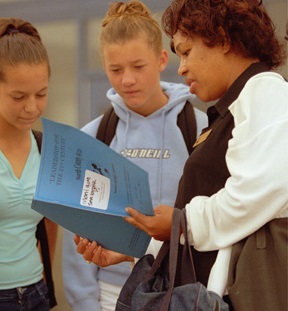The Most Important Year of School Is…
 AVID Center
AVID Center  Friday, January 10, 2014 at 10:11AM
Friday, January 10, 2014 at 10:11AM By Stephan Maldonado, Managing Editor, Teach.com
This piece originally appeared on the Teach.com blog. At AVID Center we know that freshman year can be pivotal for all students, especially those in the AVID elective. It can deeply affect their high school and college trajectory. Below Maldonado discusses some of the stressors freshmen face and what schools are doing to help keep them on a path towards graduation.
The answer is freshman year of high school, at least when it comes to predicting who is likely to drop out or not. According to The Atlantic, the periodical Education recently released research findings that prove ninth grade to be a “bottleneck” year with freshman having the highest levels of absenteeism, the lowest GPAs, the most failing classes, and the highest level of behavioral referrals when compared to other secondary grades. While the year 1970 found 3 percent fewer students in tenth grade than ninth, that statistic grew to 11 percent by the year 2000.
A Major Transition
In order to make sense of these numbers, it is important to realize all of the changes that occur around the time an adolescent is 14 or 15 years old. Jon Zaff, director of the Center for Promise at Tufts University, views ninth grade as a time of flux. He said, “More and more of us are realizing that it’s the make-or-break year for many 14- and 15-year-olds. It’s a time when the cognitive, emotional and physical are all coming together. The schools are likely new environments, and the students have more autonomy and more homework.” Not only are students acclimating to the rigor of high school, they are struggling to balance their changing bodies, increasing independence and peer relationships. Dr. Linda Stern, Washington D.C. psychoanalyst agrees. She adds, “Students entering high school — just at the time brains are in flux — still have the propensity to be impulsive and are prone to making mistakes. They are therefore experimental and trying to separate and might try substances that interfere with the normal developmental process. Put all that together with raging hormones, the normal academic pressures and meeting a whole new group to be judged by.”
Given the whirlwind of hormones and emotions, it is not surprising that more ninth graders fall behind in their work. However, once an already vulnerable student fails a class or even ninth grade, things become further compounded as students struggle with self-esteem and peer affirmation. Zaff refers to the disproportionate numbers of failing ninth graders as the “ninth grade bulge.” He says that this “bulge” is particularly dangerous because students “are stigmatized socially as well as academically, which can also lead to their finding it easier to just give up.”
Proactive Approaches
Early intervention is often the key to true success, and there are three areas that can help predict whether a student is at risk for dropping out or not: attendance, grades, and student behavior. The National High School Center has published a guide on what signs to look for in potential dropouts. The first 30 days of school is a particularly meaningful time, especially with attendance. Students who are absent for more than 10 percent of the first 30 days need extra attention, as well as students who get more than one F per report card.
In order to provide ninth graders with the support that they need, some high schools offer freshman seminars that teach skills like socializing and studying, which is especially valuable in areas where there is a lot of poverty. Mary Maushard, communications director at the Everyone Graduates Center through Johns Hopkins University, feels that the seminar is essential for freshmen. She stated, “We try to build some relevance into their experience to go along with the regular curriculum. So many of these ninth graders — particularly in high-poverty areas — just don’t see any reason to stay in school.”
Other urban schools have implemented programs that specifically target high-risk freshman. Zaff feels that schools simply need to focus on the right questions in order to find the proper solutions. He believes that schools need to focus on individual students and ask, “What does each of these potential dropouts in the ninth grade need as they make this big transition? It’s a time of great upheaval and great opportunity.”
We want to hear from you, AVID World. What does your school do to reach freshmen students and put them on a track to college and career readiness?
Reader Comments (1)
This is so true! My daughter is a freshman in college and she spoke to my AVID classes while she was home for her college winter break. Her message to them was- "Nineth grade is your most important year. Start off really strong and it will pay off in the end!" She encouraged them to sharpen their study habit skills now while in the eighth grade so that the transition would be smooth! The best was when she said, "My mother and your AVID momma told me these things when I was your age. I didn't listen right away and the transition was harder! Now I truly know that our moms really do know best!" My eighth graders have really taken what she said to heart and listens more closely to my words of wisdom, too!